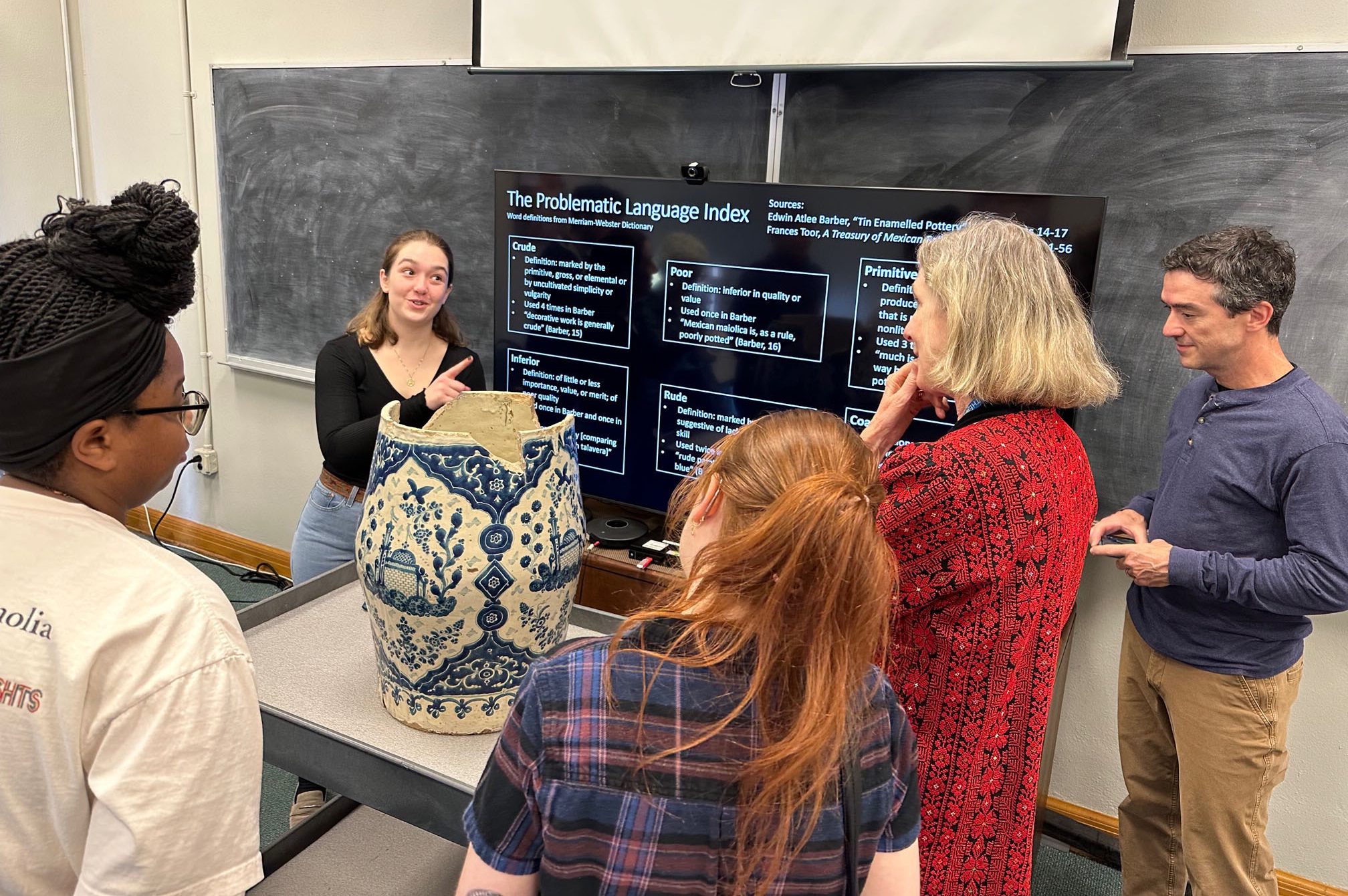Amanda Lipp made no secret about it. After taking her first Art History class in high school, “I quickly realized that I wanted to study the subject for the rest of my life,” she said.
Fortunately for the School of Art, she decided to pursue her passion at the University of Arizona – and now she’s unlocking mysteries of 18th century Mexican pottery and researching discrimination that still exists 50 years after Linda Nochlin’s 1971 groundbreaking essay, “Why Have There Been No Great Women Artists?”
Lipp, who just graduated, received the fall 2022 Outstanding Senior Award from both the entire College of Fine Arts and the School of Art for her devotion to scholarship and art communities through her museum work, volunteerism and leadership.
At a recent presentation at the Arizona State Museum on campus, Lipp enlightened an audience of peers, faculty and the public about the museum’s 18th century Mexican talavera jar – and how the earthenware has been misunderstood historically.

“What makes Amanda so special is that she genuinely enjoyed tackling an object that was not going to reveal its secrets easily,” said Professor Stacie Widdifield, who oversaw Lipp’s project. “She not only literally looked at the jar from all sides, that is materially, but also in the context of the ASM collection and then in the broader art historical and museum context.
“Her joy and enthusiasm for the project was boundless.”
Some of that joy came from Lipp’s determination to learn more about her heritage.
“Part of my family is Mexican, but I’ve always felt a kind of disconnection from that culture,” Lipp said. “Connecting to talavera and to these deep parts of Mexican culture impacted by colonialism and many cultural shifts has been a way to connect back to myself and my family.”
Lipp grew up in Tucson and attended University High, where she was mentored in Art History by Whitney Sheets.
At the University of Arizona, she majored in Art History and minored in Art and Visual Cultural Education. She held internships in Tucson’s Museum of Contemporary Art and the Phoenix Museum of Art, where she assisted in the curation and installation of the popular 2018 exhibition, “In the Company of Women.”
The Phoenix all-woman exhibition “got me thinking about tokenism, exceptionalism, and the idea of genius,” Lipp said. “I thought it was interesting that the Linda Nochlin article so many curators referenced — ‘Why Are There No Great Women Artists?’ — seemed to contradict having these ‘all-women’ exhibitions.
“Systemic oppression and discrimination are an ongoing battle, and part of that battle is researching and uncovering those systems,” said Lipp, who wrote a paper on the subject for Professor Irene Romano. “I want to continue research on this project in the future, because I think it is important to do research based on real world issues.”
In spring 2022, Lipp also interned at the University of Arizona Museum of Art, where she developed a research guide for women artists in the collection, facilitating hands-on activities at community events, observing gallery tours and providing feedback on the tours.
She was awarded the School of Art’s Undergraduate Schaeffer Prize in the Art History Research Paper Prize competition in spring 2022 for her analysis of the talavera jar in Widdifield’s class. Lipp presented her research at the first Arizona Latin American Studies Symposium.
For her final paper in Professor Carissa DiCindio’s museum education class, Lipp focused on engaging people with art outside of museum spaces, holding a “Kunst” event at her home and discussing ways museum education practices could be used to garner interest in artist Gustav Klimt among her guests.
“Amanda dives into projects with creativity and focus,” DiCindio said. “She is definitely a student who really loves the work she is doing.”
Lipp restarted the school’s Undergraduate Art History Club and became its president, planning events to raise interest in and awareness of art history. She also served as a grant panelist for the Arts Foundation for Tucson and Southern Arizona.
In Professor Larry Busbea’s classes, she conducted probing research on institutional critique and psychedelic graphics from the 1960s.
“Out of more than 30 years of undergraduate teaching, Amanda stands out in my mind as one of our Art History program’s most informed and mature students,” Professor Paul Ivey wrote, “exhibiting creative innovation, intellectual vitality and rigor, and a gregarious drive to learn and integrate what she learns with her goal to become a professional art historian.”
Lipp’s ultimate goal, indeed, is to become a museum curator or educator, preferably for Latin American art. She’s planning on pursuing a master’s in Art History and a doctorate in either Art History or Art Education.
“Right now, I have it planned out, but who really knows what the future holds,” said Lipp, who has future trips schedule to Europe, Mexico City and Puebla, Mexico.
“It turns out, I love to teach and make art accessible,” Lipp added. “The School of Art really provided the perfect place to interweave my dual interests of people and art.”





